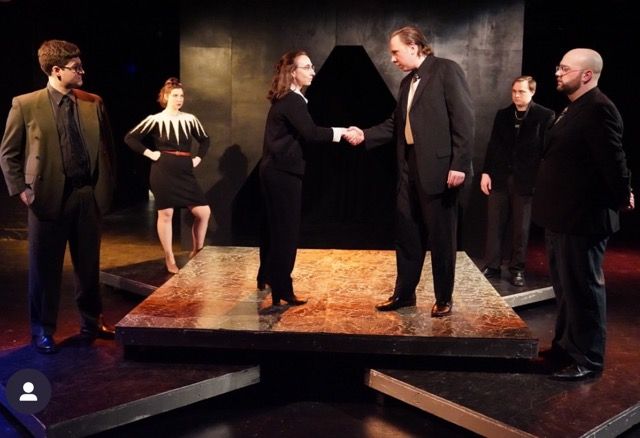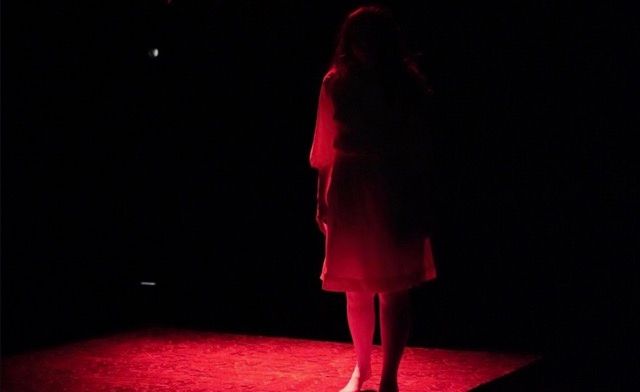
‘Julius Caesar’ – Written by William Shakespeare. Directed by Charlie Lunardi. Stage Management by Zoe Moore; Scenic Design by Just Lahue; Lighting Design by Hope Debelius & Rachael Harned; Prop Design by Melinda Kalanzis; Costume Design by Gaby Obando Arévalo; Sound Design by Sam Noto. Produced by Deadword Theatre Company, ‘Julius Caesar’ runs from March 6th – March 16th at 539 Tremont Street, Boston, MA 02116.
By Charlotte Snow
The time has come when Julius Caesar sadly becomes relevant again. This year, it’s more dangerously relevant than ever. Political violence, tyrannical rule, socioeconomic gaps, and more exist in both today’s headlines and Shakespeare’s 426-year-old play. Some theater companies shy away from this script during the post-election season for this very reason, others embrace it. I’m thankful that Deadword Theatre Company, a rising gem in the Boston theater scene, has so boldly staged one of the theatrical cannon’s most spitfire plays.
For those who were never taught it in a high-school English class, Julius Caesar details the plight of Roman senator Marcus Brutus, “the most honorable Roman.” Despite being a confidant of Caesar, Brutus is webbed into a conspiracy to assassinate him, which famously occurred on the steps of the capitol during the Ides of March. Once Caesar’s death leads to a civil war, Brutus is left picking up the pieces of his shattered ideals of honor.

Director Charlie Lunardi, co-founder of Deadword, recognizes the play’s inherently strong themes and sets it firmly on Wall Street during the 80s, where corporate greed and yuppie culture were joined hand in hand. Lunardi’s sharp eye for aesthetics and a stage picture is palpable and a joy to behold. The production’s visual variety was a high point, as it was always engaging and never felt forced or overly indulgent. Her staging of Caesar’s ghost throughout Act Two was a visual treat and defined Caesar as a presence far beyond the initial death scene.
Because there is such a solid sense of setting, it sometimes clashes with Shakespeare’s early modern English. I was left wondering why knives were wielded instead of guns, which is a recurring question anytime a classical piece is thrust into a contemporary setting. In general, there were times when I craved for the stakes to be higher.
The production design does a fine job overall of establishing the setting. Justin Lahue’s set consists of a striking yet simple layout of platforms and creatively adorns the left section of the house with rolling chairs, desks, and appropriate 80s tech. Melinda Kalanzis’ prop design fits seamlessly with the times, and Gaby Obando Arévalo’s costumes bring an added layer of personalization (although some of the black and white clothing tended to blend into the plaza.)
The sound design, mainly composed of ambient noises, was serviceable, but lacking. The 80s had such a vibrant and distinctive sound that I wish was more prominent in the underscoring and transitions. The sound rarely provides a sense of change in physical location or the spectacle-heavy scenes.

The performances were committed and delivered the necessary energy required for the piece. Some actors did a better job than others at bringing meaning and personalization to Shakespeare’s words. Thankfully, those who were charged the most with moving the plot forward: Chloe Burton, Henry Valleau Schuth, Jack Aschenbach, Isabelle Bushkov, and Sara Eakman were all standouts and had a definite clarity of thought and intention. If this is your first time seeing a Shakespeare play, this production may not help you understand every beat of each scene. However, the overarching story is very much intact and is often quite striking.
The production fired on all cylinders at the start of Act II when Jack Aschenbach’s Mark Antony, who constantly wavered between mercurial and malicious, rallied the crowd to an insurrection. It was a beautiful interplay between actor and ensemble that was visceral and raucous. There were also times I felt resigned to letting the plot wash over me. Although Deadword’s production of Julius Caesar sometimes fell short of the theater company’s intention to deliver a powerful message, it grabbed my attention with its enviable stabs toward boldness. For information and tickets, go to: http://wklb.do617.com/events/2025/3/13/julius-caesar-tickets

